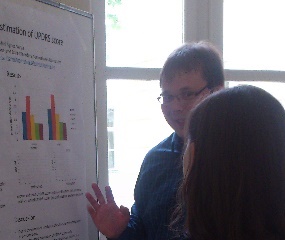
|
Home Books & Chapters Publications Video Lectures PyHubs Typing Dynamics | |||||
|
Video lecture on person identification based on keystroke dynamics
We have just uploaded a short video lecture about our work on person identification based on keystroke dynamics. See our page containing resources related to typing dynamics.
A model for classification based on the functional connectivity pattern dynamics of the brain
We are happy to announce that our recent work titled A model for classification based on the functional connectivity pattern dynamics of the brain has been accepted for publication in the proceedings of the Third European Network Intelligence Conference (ENIC 2016) and it will be presented at the conference. See you there!
Challenge - person identification based on keystroke dynamics
We are happy to announce an open challenge on person identification based on keystroke dynamics! Person identification is essential in various online services such as banking or online exams. Typing dynamics is a simple biometrics that allows user identification. In order to successfully apply user identification based on keystroke dynamics, machine learning is required. In order to encourage research in this important domain, we announce an open challenge.
Collaboration with researchers of the Babes-Bolyai University
Together with researchers from the Babes-Bolyai University in Cluj Napoca, we aim to explore how community detection techniques can be used to find communities of brain regions. We analyse the community structure under various conditions, such as different phenotypes, presence or absence of a disease, addiction, etc. On the long term, such an analysis may contribute to better understanding the phenomena and mechanisms underlying various diseases and phenotypes. First results of this collaboration will be presented at the 14th International Conference on Parallel Problem Solving from Nature and they will appear in the proceedings of the conference.
Classification of fMRI data using Dynamic Time Warping based functional connectivity analysis
We are happy to announce that our recent work on Classification of fMRI data using Dynamic Time Warping based functional connectivity analysis has been accepted for publication in the proceedings of the EUSIPCO 2016 conference.
Meet us at SACI!
In just a few days, we will start off to Timisoara where IEEE's 11th International Symposium on Applied Computational Intelligence and Informatics will be organized. We aim to give two talks, one about the prediction of interactions between drugs and pharmacological targets and another one about person identification based on keystroke dynamics. We hope that you will find them interesting!
Ladislav's talk: recommender systems are much(!) more than matrix factorization
Today, Mr. Ladislav Peska, our guest researcher gave an extraordinarily interesting talk about recommender systems. During the informal discussion in the cafeteria of our institute, we learned from him that real-world recommender systems are much more interesting than we would have ever thought: what matters is not another regularization term in the optimization objective of matrix factorization, but the surprisingly many different types of data that capture different aspects of users' behaviour. Please click here for the slides.
Ladislav's visit
Mr. Ladislav Peska, co-author of one of our recent papers, has recently started his research stay at the Brain Imaging Center of the Research Center of Natural Sciences. We wish successful work!
Dori's new project
Dóra Neubrandt, who successfully participated at TUDOK 2015 conference with the Angel Personal Sleepometer is working on a new machine learning project. We hope, we will be able to report about new results soon!
Paper award at CORES 2015
The 9th International Conference on Computer Recognition Systems (CORES) took place in Wroc│aw (Poland) a few days ago. Best papers and best presentations were kindly awarded by the Organizing Committee of the conference. It is an honour for us to announce that Krisztian Buza was one of the awarded participants with his work titled Semi-supervised Naive Hubness-Bayesian k-Nearest Neighbor for Gene Expression Data.
Mararu Vlad joined the BioIntelligence lab for an internship
Mararu Vlad, MSc student, has recently joined our team for an internship with strong desire of studying machine learning and working with us on challenging research tasks in bioinformatics. In particular, Mr. Mararu will focus on the implementation of hubness-aware classifiers and regression techniques in Python and R. The relevance of his work in underlined by the fact that, despite the growing interest in hubness-aware classification, only Java-based implementations are publicly available at the moment. Therefore, his work is expected to extend the hubness-aware research community and to contribute to further applications of hubness-aware techniques.
Krisztian Buza and Noémi Ágnes Varga have just presented their work at DUCOG
Krisztian Buza is an invited speaker of the 9th Hungarian-Japanese Symposium on
Discrete Mathematics and Its Applications
Kristˇf Marussy won the second prize at students' scientific conference
We opened the BioIntelligence site
|
||||||
